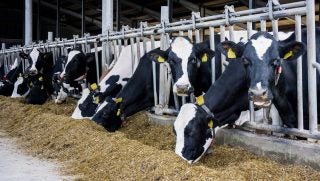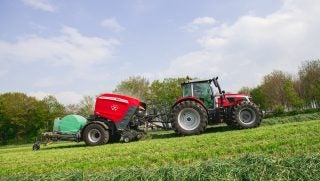Survey data shows that 71 percent of farmers around the world have seen large impacts from climate change on their operations, with income being reduced 15.7 percent on average over the past two years. Some farmers even identified losses of more than 25 percent.
While producers are addressing the short-term economic challenges, the survey also shows that four out of five farmers have already taken or plan to take steps to reduce greenhouse gas emissions. This is something that is being seen a lot in the U.S., for example with the adoption of no-till and cover cropping strategies.
The findings are part of the Farmer Voice survey, commissioned by life science company Bayer and conducted by an independent agency. The 800 farmers interviewed represented farms large and small in Australia, Brazil, China, Germany, India, Kenya, Ukraine, and the United States in equal numbers. Its goal is to explore the challenges facing farmers around the world as they try to mitigate the impacts of climate change and adapt for the future.
Farmers expect the repercussions of climate change to continue. Three-quarters of them globally (76 percent) are worried about the impact that climate change will have on their farm, with farmers in Kenya and India most concerned.
Rodrigo Santos, Member of the Board of Management of Bayer AG and President of the Crop Science Division, commented: “Farmers are already experiencing the adverse effects of climate change on their fields and at the same time they play a key role in tackling this huge challenge. This is why it is so important to put their voice front and center. The losses reported in this survey make the direct threat climate change poses to global food security crystal clear. In the face of a growing world population, the results must be a catalyst for efforts to make agriculture regenerative.”

Economics are compounding farmer pressures
While climate change is a dominant overarching theme, economic challenges are the biggest priority over the next three years. Over half (55 percent) of farmers placed fertilizer costs among the top three challenges, followed by energy costs (47 percent), price and income volatility (37 percent), and the cost of crop protection (36 percent). The importance of fertilizer costs becomes most apparent in Kenya, India, and Ukraine.
In Ukraine, 70 percent of farmers named fertilizer costs as one of the top three challenges, showing that the concrete materialized consequences of the war pose big pressures on farmers in the country. In addition, 40 percent named general disruption due to the war as a top challenge. Apart from that Ukrainian farmers share many of the same characteristics of their global peers, for example more than three-quarters (77 percent) state that climate change has already largely impacted their farm.
Farmers take steps to mitigate climate change
More than 80 percent of surveyed farmers are already taking or planning to take steps to apply measures that contribute to reducing greenhouse gases. The top focus areas are using cover crops (43 percent do so already or intend to do so), using renewable energy or biofuels (37 percent), and using innovative seeds to reduce fertilizer or crop protection use (33 percent). Alongside this, every single farmer surveyed claims to already apply or plans to apply measures to help biodiversity. Over half (54 percent) say they already apply measures to protect insects, such as insect hotels, or plan to do so in the next three years.
To be ready for the future, farmers value innovation. Over half (53 percent) of them say access to seeds and traits designed to better cope with extreme weather would most benefit their farm. A similar number (50 percent) called for better crop protection technology. Forty-two percent said that better access to irrigation technology would benefit their farm. Looking at their practices, improving efficient land use, diversifying crops, and better soil health were ranked as the most important routes to success.
Farmers agree on global challenges
Overall, the Farmer Voice survey shows that farmers around the world largely share a common view about the challenges of today and the prospects for the future. While there are slight differences between countries, the overarching issues of climate change and economic pressures are of similar concern to all.
“Farmers are facing multiple and related challenges. But despite this, we found that they are hopeful – almost three-quarters say they feel positive about the future of farming in their country,” said Rodrigo Santos. “This is impressive and encouraging. The views expressed by farmers in the report need to be widely seen and understood. They are a call to action for the entire food system to innovate, collaborate, and deliver the solutions farmers need – and we as Bayer are eager to play a leading role in these efforts. There is little time to waste.”
The Farmer Voice survey was conducted between April and July 2023. Additionally, 2,056 smallholder farmers in India were surveyed with a shortened questionnaire. These farmers were associated with the Better Life Farming ecosystem, farmers of Bayer-supported Farmer Producer Organizations, and farmers enrolled in Bayer’s Sustainable Rice Program. These interviews were conducted between May and June 2023.


